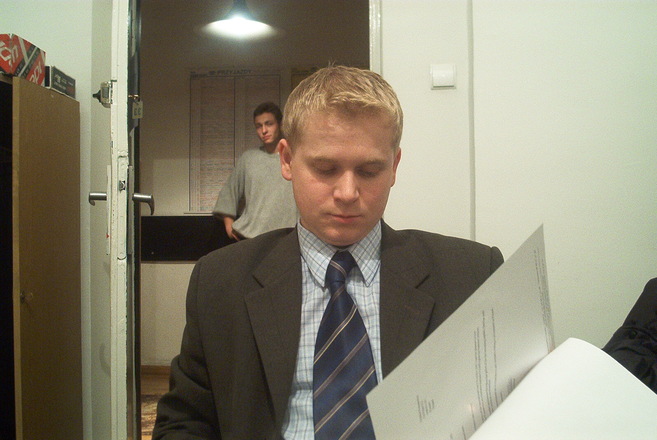11.14.15
Posted in Google, Microsoft, Patents, Red Hat, Servers at 12:06 pm by Dr. Roy Schestowitz
On carving out parts of the market using patent monopolies…
“Inventive people [at Novell] write more software patents per capita than anywhere else.”
–Jeff Jaffe, Novell’s CTO before these patents got passed to CPTN (Linux foes)
Summary: The use of a patent portfolio in the Free software world for divisive and discriminatory purposes, as demonstrated by Red Hat in servers and BlackBerry in phones
IN OUR previous articles which mentioned Microsoft’s patent agreement with Red Hat [1, 2, 3, 4, 5, 6, 7, 8, 9] we noted that:
- The patent “standstill” (implies temporary and falsely insinuates there was a two-way war) applies only to Red Hat and its customers, unless Red Hat can prove otherwise;
- The deal does not shield Red Hat and and its customers from satellites of Microsoft.
“We both know we have very different positions on software patents. We weren’t expecting each other to compromise.”
–Paul Cormier, Red HatWell, we are still waiting for Red Hat’s lawyers to speak out (Tiller and Piana were involved in this) or for Red Hat’s management to get back to us (if it decides to). They need to go “open” (like an “Open Organization” [sic]), or at least clarify in some other way what exactly Red Hat did with Microsoft regarding patents. The FAQ is far too vague and it raises more questions than it answers. If we don’t hear some time later this month, we shall assume that Red Hat is hiding something and we’ll rally Free software people (urging them to comment on this subject), set up a public petition, etc. Transparency is extremely important here. This new article quotes Paul Cormier, Red Hat’s president for products and technologies, as saying: “We both know we have very different positions on software patents. We weren’t expecting each other to compromise.”
Well, both are applying for software patents, so it’s not clear what he meant by that. Also, they compromised only among themselves; what about other entities that use the same software as Red Hat does? Are they too enjoying a patent “standstill”? Probably not. Only says ago Microsoft extorted — using patents — yet another company that was using Linux (Android was mentioned in the announcement).
“Nothing prevents Intellectual Ventures from going after Red Hat just like Acacia repeatedly did, so it’s a fool’s settlement.”What has Red Hat really achieved here? It was a selfish deal and the inclusion of patents in it was totally spurious; it does a lot more harm than good. Ian Bruce, Novell’s PR Director, once said that the Novell/Microsoft package “provides IP peace of mind for organizations operating in mixed source environments.”
Meanwhile, the Microsoft-friendly media gives a platform to the world’s biggest patent troll, Intellectual Ventures, without even calling it “patent troll”. This troll recently sued a lot of companies that distributed Linux. Nothing prevents Intellectual Ventures from going after Red Hat just like Acacia repeatedly did, so it’s a fool’s settlement.
“Remember that BlackBerry habitually speaks about using patents for revenue and for market advantage.”Speaking of potential patent dangers to Linux, recall that BlackBerry pays Microsoft for patents (including FAT, which relates to TomTom/Linux) and recall our articles about BlackBerry potentially becoming a troll [1, 2, 3, 4]. Some people’s loyalty to this Canadian brand and its newfound support for Android can blind them to the risk which BlackBerry remains, especially because of its patents stockpile.
This new article [1, 2] serves to remind us that BlackBerry still has “Software And Patent Monetization” in mind (we covered this some weeks ago, quoting the CEO). This means that, failing the strategy with Priv and Venice (BlackBerry’s Android devices and Linux-centric strategy), it could end up like Sony-Ericsson, suing Android players whilst also selling their own (unsuccessful) Android handsets.
“BlackBerry is proprietary to the core.”Remember that BlackBerry habitually speaks about using patents for revenue and for market advantage. Also remember that BlackBerry is not — at least not yet — an Android company. BlackBerry is proprietary to the core. “The QNX division could also face higher competition from open source software such as Linux,” wrote a financial site, “which many customers find more flexible and economical, limiting its potential in the burgeoning IoT and connected device market. For instance, Tesla reportedly uses Linux for its Model S sedan.”
Don’t be too shocked if BlackBerry eventually sells its patents to hostile actors, asserts them against competitors that use Android, or uses aggressive lawyers to compel various OEMs to remove features from their Android devices (both hardware and software features). █

“I’ve heard from Novell sales representatives that Microsoft sales executives have started calling the Suse Linux Enterprise Server coupons “royalty payments”…”
–Matt Asay, April 21st, 2008
Permalink
 Send this to a friend
Send this to a friend
Posted in Law, Patents at 10:36 am by Dr. Roy Schestowitz
“[The EPO] can’t distinguish between hardware and software so the patents get issued anyway.”
–Marshall Phelps, Microsoft

Summary: The biggest parasites in the software domain (not patent trolls but lawyers who help instantiate weapons for patent aggressors large and small) are looking for new and ‘creative’ ways to bypass the rules
THE USPTO and SCOTUS have both come to terms with the fact that software patents aren’t a defensible feeding frenzy. The EPO will need to realise this too, but that’s a story for another day. Is started with Bilski versus David Kappos (a software patents booster) and now we have Alice, which has vast implications for every company which still believes in software patenting as a business strategy (Trading Technologies for instance).
Jacek Wnuk has this new article in lawyers’ media. He explains the history of software patents and then offers “strategies” for getting them. Patent lawyers generally like giving tips to other patent lawyers on how to cheat the system and patent software even when there’s precedence against them. Here is Bradley Arant Boult Cummings LLP doing it. Watch them complain about the status quo: “One of the main functions of law should be to provide relatively predictable rules that allow people to order their affairs with as much certainty as possible. The development of patent law in the field of software, however, has not provided the relative predictability that minimizes unnecessary patent prosecution and litigation costs. The courts have not given much guidance on what constitutes an “abstract idea”2 but have made “abstract idea” one of the key criteria for subject matter eligibility under 35 U.S.C. § 101, and this situation has produced real-world detriments. Innovators waste money and time either seeking patents they should not seek or defending themselves from patents that should be invalid. This article proposes a new rule for software patent eligibility that could help b1ing more clarity to the field.”
What they mean to say is not “more clarity” but more business for themselves. It’s about money. Some companies ceased pursuing patents on software, so patent lawyers already feel the pinch.
Looking more closely at Wnuk’s long article, here is how he framed the situation: “The Supreme Court finally returned its attention to the “abstract idea” question by affirming its importance in a narrow 2010 ruling rejecting a patent application directed to hedging energy investment risks, Bilski v. Kappos, 561 U.S. 593 (2010). In 2014, the Supreme Court modified the “abstract idea” subject matter eligibility rule by asserting that an abstract idea could, in fact, be patentable, so long as the patent application in question claims “significantly more” than the abstract idea, which the Court decided was not present in several patent applications directed to formulation and trading of risk management contracts. Alice Corp. v. CLS Bank International, 573 U.S. ___ (2014).”
Fast-forwarding to 2015, Wnuk writes: “For patent practitioners, the Supreme Court’s Alice decision produced more questions than answers, as the Court expressly declined to define “something more” and stated that it “need not labor to delimit the precise contours of the ‘abstract ideas’ category.”
“The USPTO stepped in by publishing two sets of “abstract idea” examples based alternately on caselaw and on hypothetical claims. The first set of examples was published in January 27, 2015 (“Abstract Idea Examples”, Examples 1-5) and the second on July 30, 2015 (“July 2015 PTO Update Appendix 1: Examples”, Examples 21-27).
“The table below identifies and categorizes the examples provided by the USPTO in January and July of 2015 based on their patentability or unpatentability, and based on the reasoning provided therefore. Some examples are categorized under multiple columns where the USPTO provided multiple claims with different conclusions.”
We wish to highlight the fact that patent lawyers are big enemies here. They are trying to find clever new ways to perpetuate software patentability, defying a high court’s decision and also ignoring what software developers actually want.
Patent lawyers are — bluntly speaking — parasites. █
“Other than Bill Gates, I don’t know of any high tech CEO that sits down to review the company’s IP portfolio”
–Marshall Phelps, Microsoft
Permalink
 Send this to a friend
Send this to a friend
Posted in Microsoft, Security at 9:58 am by Dr. Roy Schestowitz
It doesn’t even look tough

Summary: Unlocking the bogus encryption of the proprietary (secret code) BitLocker is surprisingly trivial, as Ian Haken has just revealed and demonstrated at Black Hat Europe
WE previously showed that BitLocker was not designed for security because of government intervention. Microsoft ‘encryption’ and ‘security’ patches are basically intended for an illusion of security — not real security – because Microsoft sits on zero-day flaws with the NSA. In simple terms, Microsoft ensures that the NSA and its affiliates have ways by which to remotely exploit Microsoft-made software and there is nothing that people can do to protect themselves from this, except deletion of Microsoft-made software.
“There is no patch for this and all BitLocker instances to date are affected.”Microsoft encryption continues to be an utter joke if one takes this article seriously. “A researcher” — one who is not from Microsoft — is said to have “disclosed a trivial Windows authentication bypass that puts data on BitLocker-encrypted laptops at risk.” There is no patch for this and all BitLocker instances to date are affected. Remember COFEE? Microsoft basically assumes that all people are criminals and it shows.
For those who think about relying on patches, caution is advised. Microsoft patches are broken again and users are advised not to apply them. This includes last Tuesday’s security patches, which helped reveal Microsoft’s ‘enterprise’ ‘professional’ ‘quality’:
The El Reg inbox has been flooded with reports of a serious cock-up by Microsoft’s patching squad, with one of Tuesday’s fixes causing killer problems for Outlook.
“We are looking into reports from some customers who are experiencing difficulties with Outlook after installing Windows KB 3097877. An immediate review is under way,” a Microsoft spokesperson told us.
The problem is with software in one of the four critical patches issued in yesterday’s Patch Tuesday bundle – MS15-115. This was supposed to fix a flaw in the way Windows handles fonts, but has had some unexpected side effects for some Outlook users.
“Today I’ve deployed latest Outlook patch to all of my clients, and now Outlook is crashing every 10 minutes and then restarting itself. I tried on fresh Win10, no AV with latest patches applied and here we go, Outlook crashing there too,” complained one TechNet user.
“Come on guys, do you EVER do proper QA before releasing anything Office 2013 related? This is the worst version of Outlook ever. Sorry for negative attitude but this is how things are.”
People should remember that Outlook (Webmail) itself has back doors, so for anything that requires a level of privacy (not just legal work and journalism) Windows must be avoided. Microsoft is a foe of privacy and it’s not an accident. Vista 10 takes privacy violations to a whole new level. █
“Two security researchers have developed a new technique that essentially bypasses all of the memory protection safeguards in the Windows Vista operating system…”
–Dennis Fisher, August 7th, 2008
Permalink
 Send this to a friend
Send this to a friend




















 Content is available under CC-BY-SA
Content is available under CC-BY-SA